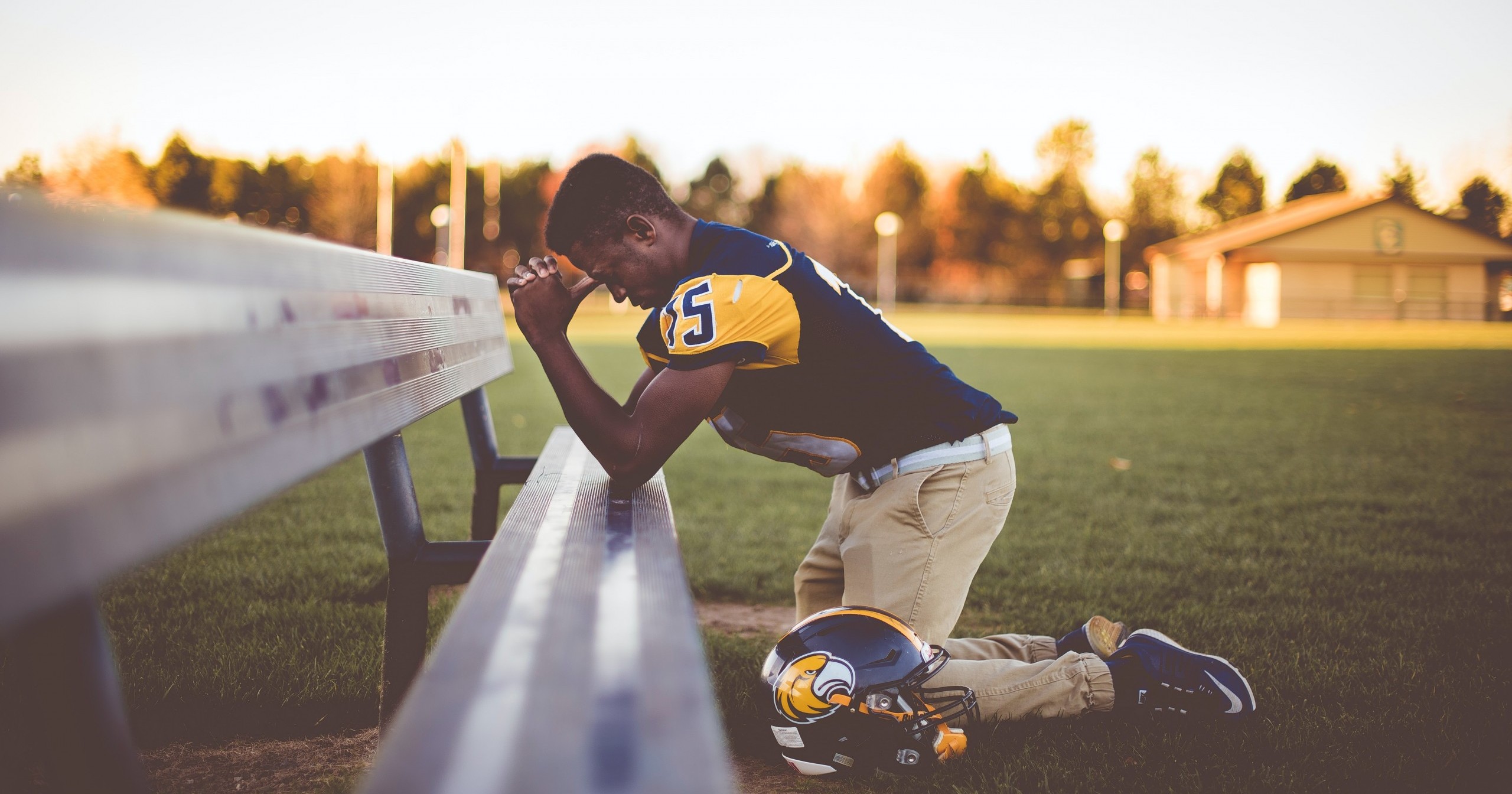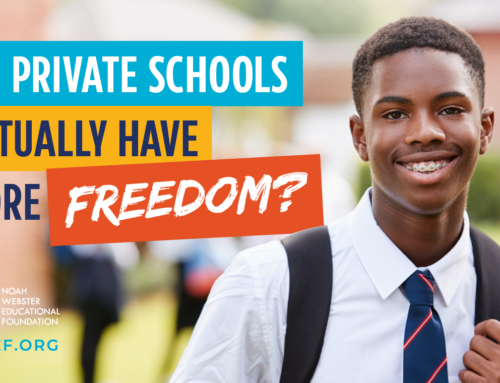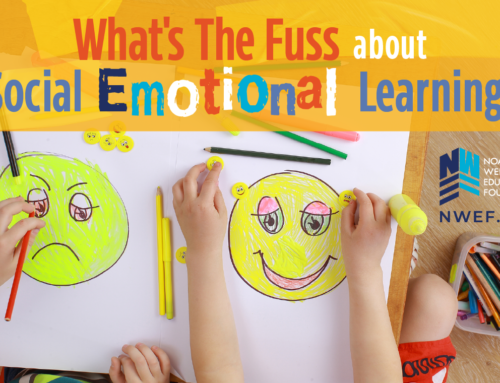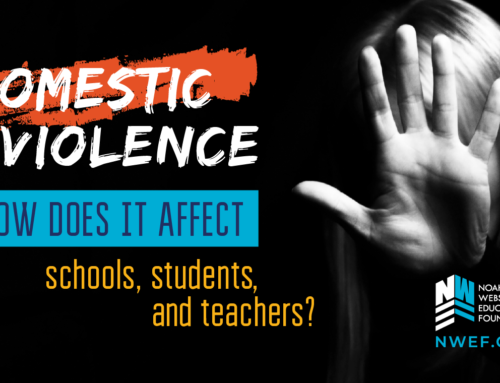
Whatever happened to faith and morality in American education?
Here at the Noah Webster Educational Foundation, our fourth core principle is faith and morality.
We believe faith and morality are essential elements for character development, human flourishing, and civil society. Not only are these principles an integral part of America’s history and culture, but denying their importance is harmful to our schools and communities.
Have you wondered about what role faith and morality should play in American education? Do you know why they are important?
We’ll tackle these questions in today’s post. But first, let’s talk about what we mean by faith and morality and how the two go hand in hand.
Defining faith and morality
To break down the definitions of faith and morality, there’s no better place to start than Noah Webster’s 1828 dictionary.
Webster defines faith as “the assent of the mind to the truth of a proposition advanced by another; belief, or probable evidence of any kind.”
He describes morality as “the doctrine or system of moral duties, or the duties of men in their social character; ethics” or “the practice of the moral duties; virtue.”
To compare the two definitions, faith is a system of beliefs, while morality is a system of moral obligations directing how we interact with our neighbors and society. The two coincide because what you believe inevitably shapes your morality.
Until recently, people believed faith and morality were inseparable.
Faith and morality in American education
Take a step back in time to the Revolutionary War period when our nation came into being. There we meet Noah Webster, the Father of American Scholarship and Education.
Webster served as a soldier during the Revolutionary War and supported the birth of the new nation. As a lexicographer, his most notable works include his dictionary and his textbook “The American Spelling Book.” Traditionally published with a blue cover, it was often simply referred to as the “Blue-Backed Speller.”
According to Britannica.com, “Webster was instrumental in giving American English a dignity and vitality of its own. Both his speller and dictionary reflected his principle that spelling, grammar, and usage should be based upon the living, spoken language rather than on artificial rules. He also made useful contributions as a teacher, grammarian, journalist, essayist, lecturer, and lobbyist.”
From America’s inception, faith and morality featured in education. In the following sections, we will examine faith and morality in education in the 1700s, 1800s, 1900s, and 2000s to compare each century’s approach.
Faith, morality, and education in the 1700s
Noah Webster published his Blue-Backed Speller in 1783. Teach US History describes it as a popular textbook for children, selling 100 million copies by the end of the century!
“It not only taught students how to read and spell, but also provided lessons on subjects such as morality and the principles of American government,” Teach US History explains. “This last was particularly close to the heart of Webster’s work, for through his dictionary, speller, and other educational work, he hoped to create a distinctly American culture and language.”
In Webster’s Blue-Backed Speller, students found sentences such as the following:
- “God will bless those who do his will.”
- “The preacher is to preach the gospel.”
- “God made the ear, and He can hear.”
- “The wicked know not the enjoyment of a good conscience.”
- “Men devoted to mere amusement misemploy their time.”
As you can see, students in the 1700s were no strangers to the concepts of faith and morality.
Without a doubt, America was founded by individuals who supported faith and operated on strong morals.
Faith, morality, and education in the 1800s
In the 1800s, American families were introduced to public schools. While the Blue-Backed Speller continued to make an appearance, another popular set of books came into popular use: the McGuffey Readers. These textbooks further contributed to the American emphasis on faith and morality in education.
“The McGuffey Readers became cornerstones in establishing America’s moral values. Although the books were not overtly religious, they did stress religious values and emphasize moral lessons intended to develop students into good citizens. For more than a century, the books encouraged moral values and conveyed a distinctly American cultural framework, with an emphasis on allegiance to the nation. To illustrate the concepts, the McGuffey Readers presented stories emphasizing strength of character, truth, and goodness. The stories distinguished between good and bad by introducing varying viewpoints on many issues and topics, and they concluded with morals, often concerning goodness, truth, and untruth.”
Faith, morality, and education in the 1900s
The Pew Research Center provides a look into the 20th century’s view of faith and morality.
In the 1940s, “the high court invalidated the practice of having religious instructors from different denominations enter public schools to offer religious lessons during the school day to students whose parents requested them.”
The article goes on to state that four years later, “in Zorach v. Clauson, the court upheld an arrangement by which public schools excused students during the school day so they could attend religious classes away from school property.”
Many other religious battles surfaced in the court system during the 1900s. For better or worse, the 1900s opened a conversation about where to draw the line between individual beliefs and public education.
Faith, morality, and education in the 2000s
Now, in the 2000s, the news is full of reports of parents and children at odds with school administrators on the issues of faith and morality.
For example, some people think that permitting biological boys who identify as female to use girls’ restrooms is a moral issue. Other parents find themselves shocked at the images shown to their students under the banner of education. Today, parents of all beliefs have the difficult job of navigating these polarizing cultural issues with their children. What does one do when the teacher is positing one thought while you’re trying to teach the opposite?
Of course, this review of the 1700s to the present day is a mere glimpse of the history of faith and morality in American education.
Why faith and morality matters
Faith and morality are inescapable per their definitions. Even for those who consider themselves non-religious, we all hold to some system of ideas about the world around us. We all have obligations to our neighbors.
If everyone carries around a system of beliefs inside them, character formation is a critical part of education.
Why should moral behavior be taught in school? Consider the following thoughts:
- Intellect, without the basis of morality, is counterproductive for a healthy society.
- Education, without the application of faith and morality, fails to inform the whole human experience. (People are not just minds or just bodies; we are whole beings with a spiritual component.)
- Instruction in faith and morality is primarily the responsibility of a child’s parent/guardian. Home values must be supported—or at the very least, not undermined—at school.
As a parent, it’s your job to seek out an education for your kids that reinforces your values. School should serve as an extension of your family, not an adversary whose teachings you’re constantly having to fight against.
What happens if your local school doesn’t cooperate? While you should certainly teach your kids to show respect, kindness, and courtesy toward those who disagree with them, you have the right to raise your children according to your family’s beliefs. This right includes your ability to remove your children from a negative or unhelpful educational environment if necessary. That’s why school choice matters.
That’s also why you need to advocate for your child and know your family’s rights. Here at NWEF, we want to provide you with the information and tools you need to stand up for your kid’s education.
Sign up for updates to learn more about the new resources we’re sharing every month!





[…] the Noah Webster Educational Foundation, we believe faith and morality are essential elements for character development, human flourishing, […]
[…] internet is overflowing with faith-based resources to help you share your ideas of faith and morality with your kids. While you can’t—and shouldn’t—make them believe anything, your consistency, […]
[…] less crucial than the “3 Rs,” moral values and good character should be considered foundational for any child’s […]
[…] to learn how to “think, feel, and act” in ways that benefit them and those around them, we must integrate moral training into their everyday learning. SEL attempts to do just […]
[…] less crucial than the “3 Rs,” moral values and good character should be considered foundational for any child’s […]